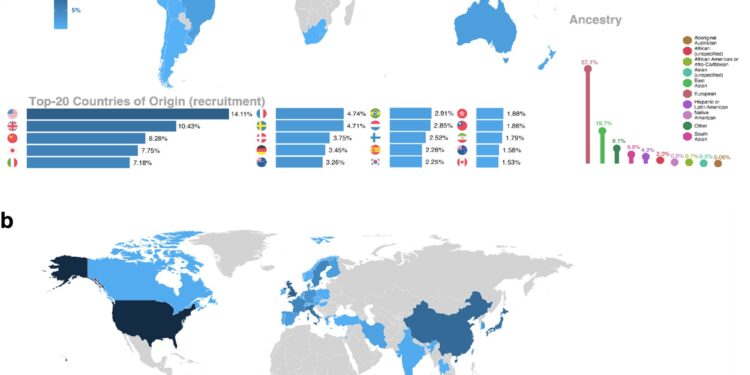Global distribution of origin and ancestry of the populations studied and countries of affiliation and gender distribution of the authors of the included studies. Credit: Communication medicine (2024). DOI: 10.1038/s43856-023-00429-z
An international academic consortium has identified 13 biomarkers that significantly improve the ability to accurately predict cardiovascular disease risk in people with type 2 diabetes. The analysis, led by 23 experts from 11 countries, was led by the Johns Hopkins University in the United States, the Chinese University of Hong Kong in Hong Kong and Lund University in Sweden.
The analysis was published on January 22 in Communication medicine.
Although people with type 2 diabetes are twice as likely to develop cardiovascular disease as people without diabetes, it is difficult for clinicians to predict who in this population is most at risk. Traditional risk scores, which reflect the level of risk in the presence of certain risk factors, have become outdated and do not perform well in various populations.
“More than 500 million people worldwide are living with diabetes,” says co-senior author of the analysis Maria F. Gomez, Ph.D., research group leader at the University of California Diabetes Center. Lund and professor of physiology at Lund University. “With numbers this high, it is important to identify readily available ways to accurately classify patients so that those at higher risk for cardiovascular disease can receive the preventive care they need.”
With this in mind, the research team reviewed and analyzed medical studies published from 1990 onwards that investigated the differences between people with type 2 diabetes who had cardiovascular disease and those who did not.
“Our goal was to identify promising markers that may improve the prediction of cardiovascular risk in people with type 2 diabetes,” says Nestoras Mathioudakis, MD, MHS, co-senior author of the analysis, co-director of the Johns Hopkins Medicine Diabetes Prevention & Education Program and associate professor of medicine at the Johns Hopkins University School of Medicine. “We wanted to go beyond traditional prognostic factors like hypertension and smoking.”
From their review and analysis of published medical literature, the team extracted data on 321 biomarkers and found that 13 of them were significantly associated with cardiovascular risk in people with type 2 diabetes.
The most notable biomarker was N-terminal pro-b-type natriuretic peptide (NT-proBNP), currently used to monitor the heart failure status of patients. The team found that in several studies, higher levels of NT-proBNP in the body correlated with a higher risk of cardiovascular disease. A study of 16,000 patients that the team looked at found a 64% increase in risk rate for each standard deviation increase in NT-proBNP.
“The 13 biomarkers, particularly NT-proBNP, warrant further testing to assess their potential,” says Ronald Ma, MBBChir., FRCP, FHKCP, FHKAM, co-senior author of the analysis and SH Ho Professor of Diabetes at the Chinese University of Hong Kong. “If future studies confirm their value in predicting cardiovascular risk in patients with type 2 diabetes, we may be able to change standards of care.”
More information:
Abrar Ahmad et al, Precision prognostics of cardiovascular disease in type 2 diabetes: a systematic review and meta-analysis, Communication medicine (2024). DOI: 10.1038/s43856-023-00429-z
Provided by Johns Hopkins University School of Medicine
Quote: Analysis reveals biomarkers that improve the accuracy of predicting cardiovascular disease risk in people with type 2 diabetes (January 25, 2024) retrieved January 25, 2024 from
This document is subject to copyright. Apart from fair use for private study or research purposes, no part may be reproduced without written permission. The content is provided for information only.



